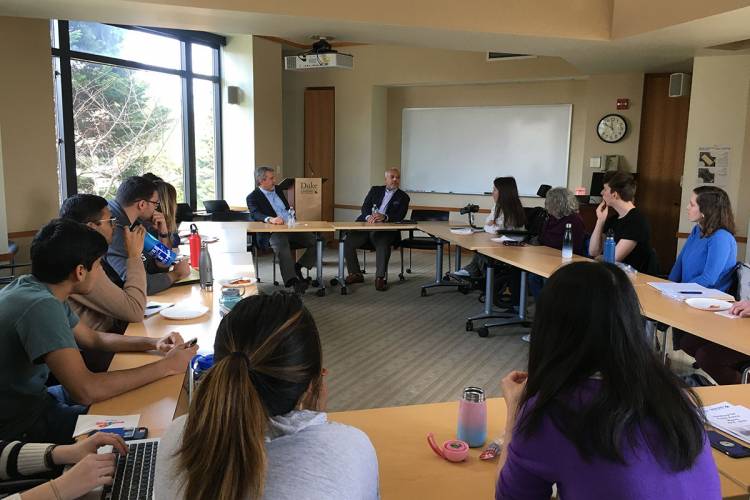By Jessica Sullivan ’21
Mo Elleithee, former spokesman for Hillary Clinton’s 2008 presidential campaign and later for the Democratic National Committee, has no interest in partisan politics.
During a talk last week at Duke, Elleithee explained why.
He shared how stratification has impacted our politics, noting that people are moving into neighborhoods surrounded by people who “think and sound and look like they do,” as well as working, going to school and following on social media the same types of people. Even the news apps, he said, reinforce these bubbles by showing similar stories.
The root of the problem is “we as a people don’t like one another. We as people have isolated ourselves from one another in very profound ways,” Elleithee said during his keynote talk at an event sponsored by POLIS: Duke’s Center for Political Leadership, Innovation, and Service.
Elleithee described polarization as a bubble that creates a sense of “rightness in ourselves and wrongness about others.” This anger and polarization, he said, is what drove him out of partisan politics.
He told students about debating then-spokesman of the Republican National Committee, Sean Spicer, on television. His young daughter was watching at home and asked her mother, “Why is daddy so angry at that man?”
Spicer and Elleithee were acquaintances who enjoyed monthly lunches where they generally discussed anything except politics. Elleithee explained that this allowed him to see Spicer’s human side and made it hard to hate him. In this age of division, Elleithee said, “everyone needs to find those opportunities.”
Mo Elleithee answers questions from Duke students.
The experience with his daughter, however, reminded him that he needed a change.
Elleithee explained how he got in, and out, of politics. He entered the field in 1994, when he had an “epiphany moment” while watching Republicans take control of the House of Representatives for the first time in 40 years.
This decision led Elleithee to a long career working on campaigns — “My home kept moving from state to state” — culminating in a high-level DNC position, when he realized that politics was getting too strident and heated.
As the founding executive director of Georgetown University’s Institute of Politics and Public Service, Elleithee now works to bridge divides and expose students to diverse perspectives.
Similar to POLIS at Duke, this center leads Georgetown’s voting initiative, hosts speakers from a variety of political backgrounds, and encourages students to engage with politics and public service. He believes that universities should be a place for students to hear viewpoints that are different from their own — not to change their minds, but to expose them to new ideas and start conversations.
“POLIS has me today, a lifelong really partisan Democrat. Last week they had Grover Norquist. I think universities can continue to offer those types of experiences that span all the divides,” he said. “The responsibility for the university is to provide these opportunities; the responsibility to make the most of them is on all of you.”
He encouraged students to take advantage of the diverse perspectives around them and avoid getting trapped in ideological or partisan bubbles.
Elleithee answered questions from students on topics ranging from the viability of Starbuck’s executive Howard Schultz’s candidacy to the opportunities and challenges he faces as a Democratic correspondent for Fox News.
When asked how we can get voters to find common ground, Elleithee pushed back, claiming that the goal of dialogue is not always common ground, and that in fact common ground may be hard to find. Instead, he said, “The goal is that the competition for ideas ought to make for better ideas and better policy.”
This applies on college campuses, but also in Elleithee’s role as a spokesman for campaigns and the DNC, he added.
During the 2016 election, many Trump supporters voted for him not because they liked the billionaire, but because they wanted change. When courting those voters, Elleithee said, “We need to all do a better job of finding those people who feel alienated, figure out why, and talk with them, not tell them that they’re fine.”
People engage with stories, so campaigns need to orient themselves around the voter instead of around the candidate.
He encouraged students to see campaigns as a traditional storyline, but with a twist. “Candidates aren’t the heroes,” he said. “Voters are. They’re trying to reach a goal, like a better economic standing for their family, facing obstacles around the way, and the candidate is auditioning to be the Yoda to help clear those obstacles.”
The Sanford School of Public Policy and Duke Democrats cosponsored the event.




